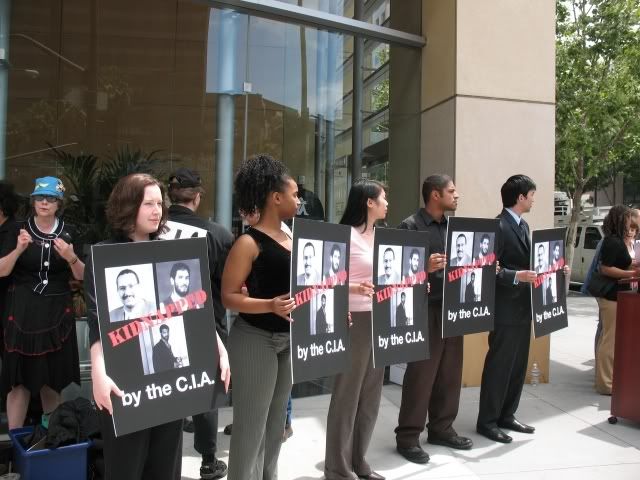 I listened to the oral arguments of the Jeppesen civil lawsuit seeking damages from an aircraft company for its role in the rendition & torture of 5 suspected terrorists. It was shocking to hear that Obama wants to continue Bush’s policy to elevate state secrets from an evidentiary privilege to blanket immunity. Under this view, the subject matter of a lawsuit is grounds for dismissal even if the plaintiff does not need any classified evidence to prove its case. This is not the standard created by the US Supreme Court, the law governing criminal litigation or the proposed law for civil litigation. The judges also seemed surprised: 2 of the 3 judges asked the DOJ lawyer if he was “representing” the “thoroughly vetted” positions of the Obama administration. Some Democrats reacted by introducing a bill today to require judges to determine “whether a blanket claim of secrecy by the government is necessary to protect national security.” (h/t Meteor Blades)
I listened to the oral arguments of the Jeppesen civil lawsuit seeking damages from an aircraft company for its role in the rendition & torture of 5 suspected terrorists. It was shocking to hear that Obama wants to continue Bush’s policy to elevate state secrets from an evidentiary privilege to blanket immunity. Under this view, the subject matter of a lawsuit is grounds for dismissal even if the plaintiff does not need any classified evidence to prove its case. This is not the standard created by the US Supreme Court, the law governing criminal litigation or the proposed law for civil litigation. The judges also seemed surprised: 2 of the 3 judges asked the DOJ lawyer if he was “representing” the “thoroughly vetted” positions of the Obama administration. Some Democrats reacted by introducing a bill today to require judges to determine “whether a blanket claim of secrecy by the government is necessary to protect national security.” (h/t Meteor Blades)
Tag: state secrets privilege
Feb 12 2009
Obama DOJ Advocates Immunity From Civil Torture Litigation
Feb 03 2009
Obama’s Answer For FISA & Torture Litigation
 As Dick and George slithered out of DC, a number of lawsuits that were filed by victims of their criminal acts involving FISA, torture and rendition have now been inherited by President Obama. Bush routinely dismissed these cases by claiming his version of state secrets privilege on unilateral steroids. The megamedia have reported that the Obama Justice Dept. has indicated in pleadings that it will also invoke the state secrets privilege. However, there is an alternative which could protect legitimate governmental prerogatives, a victim’s right of redress for harms perpetrated by government officials and society’s right for a transparent government that sustains the rule of law. The alternative is for Obama to adopt the state secrets standards that govern criminal prosecutions as his guidelines for use in civil litigation until Congress adopts the State Secrets Protection Act that was defeated last year amidst Bush’s veto threats. These guidelines are consistent with Supreme Court precedent that has rarely been correctly utilized.
As Dick and George slithered out of DC, a number of lawsuits that were filed by victims of their criminal acts involving FISA, torture and rendition have now been inherited by President Obama. Bush routinely dismissed these cases by claiming his version of state secrets privilege on unilateral steroids. The megamedia have reported that the Obama Justice Dept. has indicated in pleadings that it will also invoke the state secrets privilege. However, there is an alternative which could protect legitimate governmental prerogatives, a victim’s right of redress for harms perpetrated by government officials and society’s right for a transparent government that sustains the rule of law. The alternative is for Obama to adopt the state secrets standards that govern criminal prosecutions as his guidelines for use in civil litigation until Congress adopts the State Secrets Protection Act that was defeated last year amidst Bush’s veto threats. These guidelines are consistent with Supreme Court precedent that has rarely been correctly utilized.
